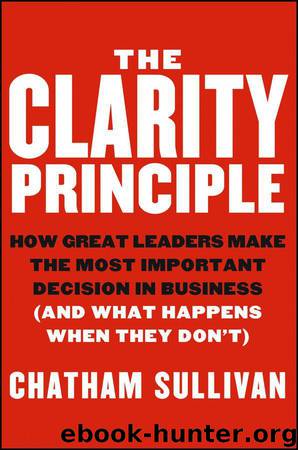The Clarity Principle: How Great Leaders Make the Most Important Decision in Business (and What Happens When They Don't) by Chatham Sullivan

Author:Chatham Sullivan [Sullivan, Chatham]
Language: eng
Format: mobi
Publisher: Wiley
Published: 2013-05-05T14:00:00+00:00
The Family Secret
There are forces—beyond the whims or agendas of even uniquely powerful individuals—that keep such core questions about the business from being publicly discussed. The very persistence of an identity crisis, its destructive impact on the performance of an organization, the emotional undertow people feel when broaching it, and its seemingly covert inner workings all suggest that many of the influential factors affecting the business are hidden from view.
As a partner at Pivot, I count myself guilty of avoiding difficult facts—and of devising ways to cover them up. I have seen and participated as a consultant in remarkably energetic initiatives to keep organizations from confronting the truth. People are amazingly willing to go along with these ploys. The tactics for avoidance vary and can often seem perfectly legitimate. For example, we may reengineer a process, go on a cost-cutting binge, pursue an innovation, create a new marketing scheme, or restructure the business (for the third time in as many years). But such initiatives are often either an ungainly compromise between mutually exclusive philosophies of the business or ways of kicking the unresolved issue down the road. These are defensive strategies for avoiding the possibility of experiencing the risk and loss that accompany big decisions.
Avoiding risk by leaving difficult matters unresolved is a powerful feature of even our most hallowed institutions. Founding Brothers, Joseph Ellis’s Pulitzer Prize–winning book about the creators of America’s experiment in democracy, beautifully illuminates how dilemmas of choice and purpose are managed. Ellis recounts how the early congressional delegates in Philadelphia brokered a number of delicate compromises over slavery and contentious questions about the balance of power between the federal government and the states. The delegates’ chief tactic was often avoidance. For example, Congress concluded that rather than residing with the federal government or the individual states, sovereignty rested with “the people.” “What that meant,” writes Ellis, “was anybody’s guess.”
Nothing caused greater anxiety than the question of slavery—not only because of the strong differences of opinion among the delegates, but also because slavery exposed the inherent contradictions in the Constitution itself. For some, like Virginia’s James Madison, the discussion was so paralyzing that obfuscation became the only possible strategy. Caught between Enlightenment principles on one hand and the planter interests of his home state on the other, Madison refused to be pinned down. Over time, he developed a knack for “artfully contrived ambiguity” to evade the issue.
Madison’s cagey behavior wasn’t simply an exercise in bad faith. He perceptively believed that the slavery controversy had the potential to destroy the union. Indeed, Ellis argues, the seminal legacy of the revolutionary generation was its successful avoidance of these problems. The founders didn’t dare to choose between competing options for what the country should be for fear that they would destroy it. It was, writes Ellis, the “unmentionable family secret.” At great human cost, the secret burst into the open when, nearly seventy-five years later, the Civil War began.
The concept of sustaining equilibrium among powerful forces is alluring. It allows you to suppose that choices can be indefinitely postponed.
Download
This site does not store any files on its server. We only index and link to content provided by other sites. Please contact the content providers to delete copyright contents if any and email us, we'll remove relevant links or contents immediately.
Hit Refresh by Satya Nadella(9126)
The Compound Effect by Darren Hardy(8949)
Change Your Questions, Change Your Life by Marilee Adams(7761)
Nudge - Improving Decisions about Health, Wealth, and Happiness by Thaler Sunstein(7694)
The Black Swan by Nassim Nicholas Taleb(7111)
Deep Work by Cal Newport(7068)
Rich Dad Poor Dad by Robert T. Kiyosaki(6613)
Daring Greatly by Brene Brown(6504)
Principles: Life and Work by Ray Dalio(6422)
Playing to Win_ How Strategy Really Works by A.G. Lafley & Roger L. Martin(6254)
Man-made Catastrophes and Risk Information Concealment by Dmitry Chernov & Didier Sornette(6007)
Big Magic: Creative Living Beyond Fear by Elizabeth Gilbert(5756)
Digital Minimalism by Cal Newport;(5750)
The Myth of the Strong Leader by Archie Brown(5500)
The Slight Edge by Jeff Olson(5410)
Discipline Equals Freedom by Jocko Willink(5381)
The Motivation Myth by Jeff Haden(5206)
The Laws of Human Nature by Robert Greene(5179)
Stone's Rules by Roger Stone(5081)
